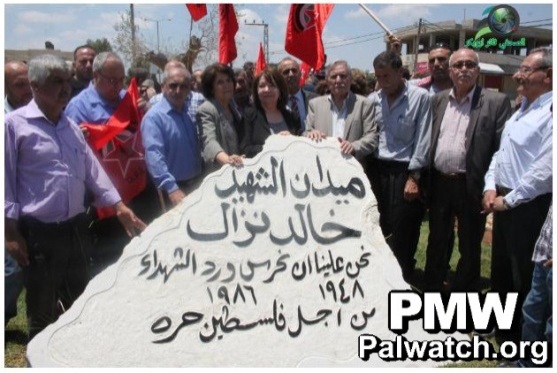Square in Jenin named after terrorist mastermind of Ma'alot Massacre
Headline: “The inauguration of the Martyr Khaled Nazzal Square in Jenin”
“The Democratic Front [for the Liberation of Palestine] in Jenin yesterday [June 15, 2017] marked the anniversary of the death as a Martyr (Shahid) of its central committee members Khaled Nazzal, Omar Al-Qassem, and Bahij Al-Majdhub (i.e., terrorists, see below –Ed.) on the 31st anniversary of the death as a Martyr of commander Khaled Nazzal, who was responsible for the [DFLP] forces assisting the Interior (i.e., Palestinian term for Israel). The Front inaugurated the Martyr [Khaled] Nazzal Square on the Jenin-Haifa Road and held a speech rally at the Jenin District hall, under the auspices of the Jenin District and the [Jenin] municipality…
Deputy District Governor of Jenin Kamal Abu Al-Rub emphasized that the response to the occupation and its aggression will only be possible through national unity.
Deputy Mayor of Jenin Mahmoud Abu Mweis said: ‘This day is one of the days when Jenin and Palestine perpetuate the history of the great commander Martyrs on the land, stones, and trees. Today we perpetuate the history of Martyr Nazzal who was buried in the Al-Yarmouk refugee camp [in Syria], in order to emphasize that the souls of the Martyrs still live among us.’ He [the deputy mayor] also emphasized that our leadership and our people will continue on the path of the Martyrs.”

This picture from the independent Jenin news website Jeningate on June 15, 2017 shows the monument at Martyr Khaled Nazzal Square.
Text on monument: “Martyr Khaled Nazzal Square
We must guard the flowers of the Martyrs (i.e., quote from song by Palestinian national poet Mahmoud Darwish)
1948-1986
For free Palestine”
Khaled Nazzal – Palestinian terrorist and Secretary of the Central Committee of the Democratic Front for the Liberation of Palestine (DFLP), and commander of its military branch. He was responsible for terrorists taking school children as hostages and murdering 22 children and 4 adults in Ma’alot (May 15, 1974), the murder of 4 hostages in an apartment building in Beit Shean on Nov. 19, 1974, and a shooting and grenade attack in central Jerusalem in which 1 was murdered and 47 others were wounded on April 2, 1984.
Omar Al-Qassem - Led a terror squad that crossed the Jordan River into Israel to carry out a terror attack in 1968. Caught by Israeli soldiers, the squad murdered two soldiers. Al-Qassem was given two life sentences, and died in his prison cell 21 years later.
Bahij Al-Majdhub – A member of the Democratic Front for the Liberation of Palestine (DFLP). He was killed in combat against the Israeli army in Sidon, Lebanon, in 1982 during the First Lebanon War.
Mahmoud Darwish is considered the Palestinian national poet. He published over 30 volumes of poetry and 8 books of prose and has won numerous awards. He joined the Israeli Communist Party in 1961 and the terrorist organization PLO in 1973, becoming a member of the PLO Executive Committee in 1987. He left the PLO in 1993 because it signed the Oslo Accords with Israel. Many in Israel see his poetry as inciting hate and violence. One poem he wrote in 1988 at the height of the Palestinian wave of violence and terror against Israel in which approximately 200 Israelis were murdered (the first Intifada, 1987-1993) calls to Israelis: “Take your portion of our blood - and be gone… Live wherever you like, but do not live among us… Die wherever you like, but do not die among us… Leave our country, our land, our sea, our wheat, our salt, our wounds, everything, and leave the memories of memory.” In 1964, he wrote a poem entitled "ID Card" in which he said: "I do not hate people, And I do not steal from anyone, But if I starve I will eat my oppressors' flesh; Beware, beware of my starving, And my rage." He also wrote “Silence for the Sake of Gaza” in 1973, which many see as glorifying terror: “She wraps explosives around her waist and blows herself up. It is not a death, and not a suicide. It is Gaza's way of declaring she is worthy of life.” His defenders have claimed that Israel misinterprets his poetry and that he sought reconciliation with Israel. One wrote in 2017: “Darwish arranged meetings between Palestinian and Israeli intellectuals, and published essays on their discussions. He was optimistic that, through mutual understanding, the two sides could eventually reconcile.” [https://www.bcalnoor.org/]
» View analysis citing this item